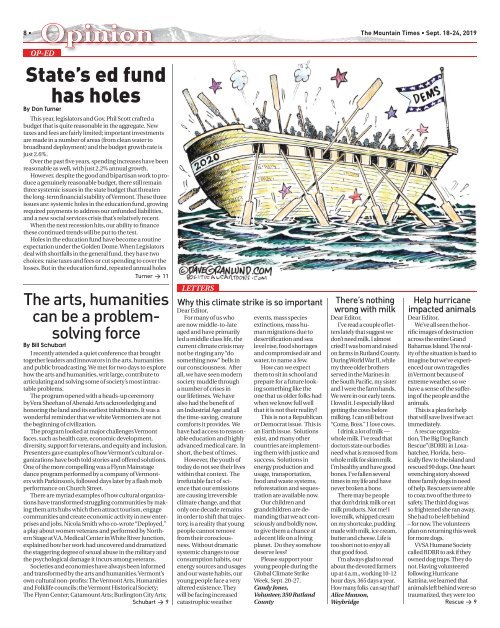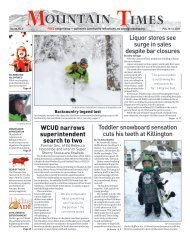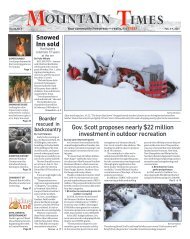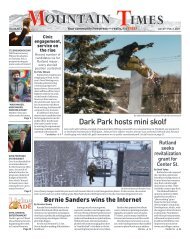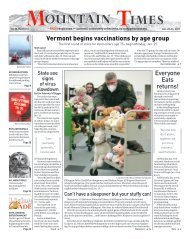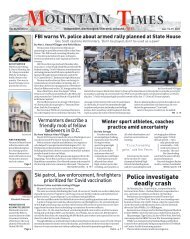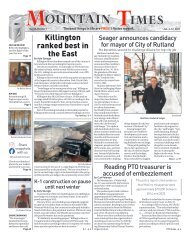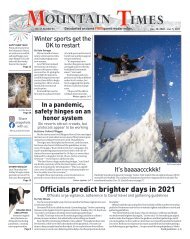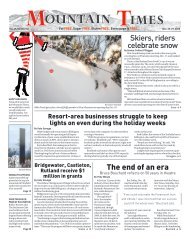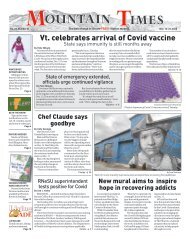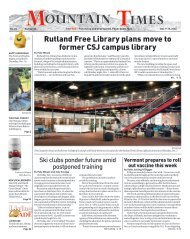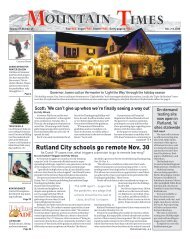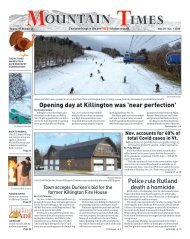The Mountain Times - Volume 48, Number 38: Sept. 18-24, 2019
You also want an ePaper? Increase the reach of your titles
YUMPU automatically turns print PDFs into web optimized ePapers that Google loves.
Opinion<br />
8 • <strong>The</strong> <strong>Mountain</strong> <strong>Times</strong> • <strong>Sept</strong>. <strong>18</strong>-<strong>24</strong>, <strong>2019</strong><br />
OP-ED<br />
State’s ed fund<br />
has holes<br />
By Don Turner<br />
This year, legislators and Gov. Phil Scott crafted a<br />
budget that is quite reasonable in the aggregate. New<br />
taxes and fees are fairly limited; important investments<br />
are made in a number of areas (from clean water to<br />
broadband deployment) and the budget growth rate is<br />
just 2.6%.<br />
Over the past five years, spending increases have been<br />
reasonable as well, with just 2.2% annual growth.<br />
However, despite the good and bipartisan work to produce<br />
a genuinely reasonable budget, there still remain<br />
three systemic issues in the state budget that threaten<br />
the long-term financial stability of Vermont. <strong>The</strong>se three<br />
issues are: systemic holes in the education fund, growing<br />
required payments to address our unfunded liabilities,<br />
and a new social services crisis that’s relatively recent.<br />
When the next recession hits, our ability to finance<br />
these continued trends will be put to the test.<br />
Holes in the education fund have become a routine<br />
expectation under the Golden Dome. When Legislators<br />
deal with shortfalls in the general fund, they have two<br />
choices: raise taxes and fees or cut spending to cover the<br />
losses. But in the education fund, repeated annual holes<br />
Turner > 11<br />
<strong>The</strong> arts, humanities<br />
can be a problemsolving<br />
force<br />
By Bill Schubart<br />
I recently attended a quiet conference that brought<br />
together leaders and innovators in the arts, humanities<br />
and public broadcasting. We met for two days to explore<br />
how the arts and humanities, writ large, contribute to<br />
articulating and solving some of society’s most intractable<br />
problems.<br />
<strong>The</strong> program opened with a heads-up ceremony<br />
by Vera Sheehan of Abenaki Arts acknowledging and<br />
honoring the land and its earliest inhabitants. It was a<br />
wonderful reminder that we white Vermonters are not<br />
the beginning of civilization.<br />
<strong>The</strong> program looked at major challenges Vermont<br />
faces, such as health care, economic development,<br />
diversity, support for veterans, and equity and inclusion.<br />
Presenters gave examples of how Vermont’s cultural organizations<br />
have both told stories and offered solutions.<br />
One of the more compelling was a Flynn Mainstage<br />
dance program performed by a company of Vermonters<br />
with Parkinson’s, followed days later by a flash mob<br />
performance on Church Street.<br />
<strong>The</strong>re are myriad examples of how cultural organizations<br />
have transformed struggling communities by making<br />
them arts hubs which then attract tourism, engage<br />
communities and create economic activity in new enterprises<br />
and jobs. Nicola Smith who co-wrote “Deployed,”<br />
a play about women veterans and performed by Northern<br />
Stage at V.A. Medical Center in White River Junction,<br />
explained how her work had uncovered and dramatized<br />
the staggering degree of sexual abuse in the military and<br />
the psychological damage it incurs among veterans.<br />
Societies and economies have always been informed<br />
and transformed by the arts and humanities. Vermont’s<br />
own cultural non-profits: <strong>The</strong> Vermont Arts, Humanities<br />
and Folklife councils; the Vermont Historical Society;<br />
<strong>The</strong> Flynn Center; Catamount Arts; Burlington City Arts;<br />
Schubart > 9<br />
LETTERS<br />
Why this climate strike is so important<br />
Dear Editor,<br />
For many of us who<br />
are now middle-to-late<br />
aged and have primarily<br />
led a middle class life, the<br />
current climate crisis may<br />
not be ringing any “do<br />
something now” bells in<br />
our consciousness. After<br />
all, we have seen modern<br />
society muddle through<br />
a number of crises in<br />
our lifetimes. We have<br />
also had the benefit of<br />
an Industrial Age and all<br />
the time-saving, creature<br />
comforts it provides. We<br />
have had access to reasonable<br />
education and highly<br />
advanced medical care. In<br />
short, the best of times.<br />
However, the youth of<br />
today do not see their lives<br />
within that context. <strong>The</strong><br />
irrefutable fact of science<br />
that our emissions<br />
are causing irreversible<br />
climate change, and that<br />
only one decade remains<br />
in order to shift that trajectory,<br />
is a reality that young<br />
people cannot remove<br />
from their consciousness.<br />
Without dramatic<br />
systemic changes to our<br />
consumption habits, our<br />
energy sources and usages<br />
and our waste habits, our<br />
young people face a very<br />
altered existence. <strong>The</strong>y<br />
will be facing increased<br />
catastrophic weather<br />
events, mass species<br />
extinctions, mass human<br />
migrations due to<br />
desertification and sea<br />
level rise, food shortages<br />
and compromised air and<br />
water, to name a few.<br />
How can we expect<br />
them to sit in school and<br />
prepare for a future looking<br />
something like the<br />
one that us older folks had<br />
when we know full well<br />
that it is not their reality?<br />
This is not a Republican<br />
or Democrat issue. This is<br />
an Earth issue. Solutions<br />
exist, and many other<br />
countries are implementing<br />
them with justice and<br />
success. Solutions in<br />
energy production and<br />
usage, transportation,<br />
food and waste systems,<br />
reforestation and sequestration<br />
are available now.<br />
Our children and<br />
grandchildren are demanding<br />
that we act consciously<br />
and boldly now,<br />
to give them a chance at<br />
a decent life on a living<br />
planet. Do they somehow<br />
deserve less?<br />
Please support your<br />
young people during the<br />
Global Climate Strike<br />
Week, <strong>Sept</strong>. 20-27.<br />
Candy Jones,<br />
Volunteer, 350 Rutland<br />
County<br />
<strong>The</strong>re’s nothing<br />
wrong with milk<br />
Dear Editor,<br />
I’ve read a couple of letters<br />
lately that suggest we<br />
don’t need milk. I almost<br />
cried! I was born and raised<br />
on farms in Rutland County.<br />
During World War II, while<br />
my three older brothers<br />
served in the Marines in<br />
the South Pacific, my sister<br />
and I were the farm hands.<br />
We were in our early teens.<br />
I loved it. I especially liked<br />
getting the cows before<br />
milking. I can still belt out<br />
“Come, Boss.” I love cows.<br />
I drink a lot of milk —<br />
whole milk. I’ve read that<br />
doctors state our bodies<br />
need what is removed from<br />
whole milk for skim milk.<br />
I’m healthy and have good<br />
bones. I’ve fallen several<br />
times in my life and have<br />
never broken a bone.<br />
<strong>The</strong>re may be people<br />
that don’t drink milk or eat<br />
milk products. Not me! I<br />
love milk, whipped cream<br />
on my shortcake, pudding<br />
made with milk, ice cream,<br />
butter and cheese. Life is<br />
too short not to enjoy all<br />
that good food.<br />
I’m always glad to read<br />
about the devoted farmers<br />
up at 4 a.m., working 10-12<br />
hour days, 365 days a year.<br />
How many folks can say that?<br />
Alice Munson,<br />
Weybridge<br />
Help hurricane<br />
impacted animals<br />
Dear Editor,<br />
We’ve all seen the horrific<br />
images of destruction<br />
across the entire Grand<br />
Bahamas Island. <strong>The</strong> reality<br />
of the situation is hard to<br />
imagine but we’ve experienced<br />
our own tragedies<br />
in Vermont because of<br />
extreme weather, so we<br />
have a sense of the suffering<br />
of the people and the<br />
animals.<br />
This is a plea for help<br />
that will save lives if we act<br />
immediately.<br />
A rescue organization,<br />
<strong>The</strong> Big Dog Ranch<br />
Rescue”(BDRR) in Loxahatchee,<br />
Florida, heroically<br />
flew to the island and<br />
rescued 90 dogs. One heart<br />
wrenching story showed<br />
three family dogs in need<br />
of help. Rescuers were able<br />
to coax two of the three to<br />
safety. <strong>The</strong> third dog was<br />
so frightened she ran away.<br />
She had to be left behind<br />
– for now. <strong>The</strong> volunteers<br />
plan on returning this week<br />
for more dogs.<br />
VVSA Humane Society<br />
called BDRR to ask if they<br />
owned dog traps. <strong>The</strong>y do<br />
not. Having volunteered<br />
following Hurricane<br />
Katrina, we learned that<br />
animals left behind were so<br />
traumatized, they were too<br />
Rescue > 9


